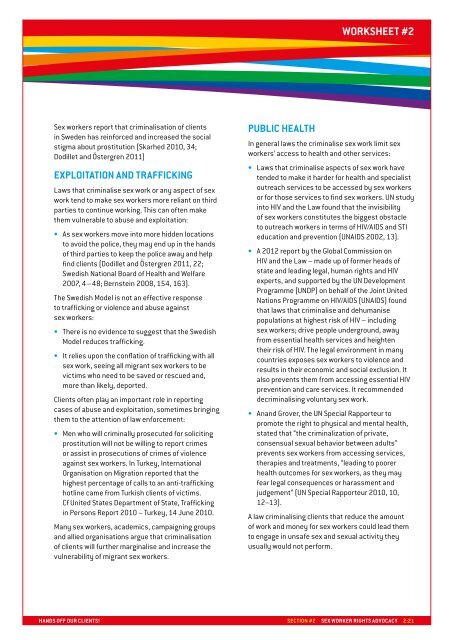hands-off-our-clients-worksheets
hands-off-our-clients-worksheets
hands-off-our-clients-worksheets
Create successful ePaper yourself
Turn your PDF publications into a flip-book with our unique Google optimized e-Paper software.
WORKSHEET #2<br />
Sex workers report that criminalisation of <strong>clients</strong><br />
in Sweden has reinforced and increased the social<br />
stigma about prostitution (Skarhed 2010, 34;<br />
Dodillet and Östergren 2011)<br />
Exploitation and Trafficking<br />
Laws that criminalise sex work or any aspect of sex<br />
work tend to make sex workers more reliant on third<br />
parties to continue working. This can often make<br />
them vulnerable to abuse and exploitation:<br />
• As sex workers move into more hidden locations<br />
to avoid the police, they may end up in the <strong>hands</strong><br />
of third parties to keep the police away and help<br />
find <strong>clients</strong> (Dodillet and Östergren 2011, 22;<br />
Swedish National Board of Health and Welfare<br />
2007, 4 –48; Bernstein 2008, 154, 163).<br />
The Swedish Model is not an effective response<br />
to trafficking or violence and abuse against<br />
sex workers:<br />
• There is no evidence to suggest that the Swedish<br />
Model reduces trafficking.<br />
• It relies upon the conflation of trafficking with all<br />
sex work, seeing all migrant sex workers to be<br />
victims who need to be saved or rescued and,<br />
more than likely, deported.<br />
Clients often play an important role in reporting<br />
cases of abuse and exploitation, sometimes bringing<br />
them to the attention of law enforcement:<br />
• Men who will criminally prosecuted for soliciting<br />
prostitution will not be willing to report crimes<br />
or assist in prosecutions of crimes of violence<br />
against sex workers. In Turkey, International<br />
Organisation on Migration reported that the<br />
highest percentage of calls to an anti-trafficking<br />
hotline came from Turkish <strong>clients</strong> of victims.<br />
Cf United States Department of State, Trafficking<br />
in Persons Report 2010 – Turkey, 14 June 2010.<br />
Many sex workers, academics, campaigning groups<br />
and allied organisations argue that criminalisation<br />
of <strong>clients</strong> will further marginalise and increase the<br />
vulnerability of migrant sex workers.<br />
Public Health<br />
In general laws the criminalise sex work limit sex<br />
workers’ access to health and other services:<br />
• Laws that criminalise aspects of sex work have<br />
tended to make it harder for health and specialist<br />
outreach services to be accessed by sex workers<br />
or for those services to find sex workers. UN study<br />
into HIV and the Law found that the invisibility<br />
of sex workers constitutes the biggest obstacle<br />
to outreach workers in terms of HIV/AIDS and STI<br />
education and prevention (UNAIDS 2002, 13).<br />
• A 2012 report by the Global Commission on<br />
HIV and the Law – made up of former heads of<br />
state and leading legal, human rights and HIV<br />
experts, and supported by the UN Development<br />
Programme (UNDP) on behalf of the Joint United<br />
Nations Programme on HIV/AIDS (UNAIDS) found<br />
that laws that criminalise and dehumanise<br />
populations at highest risk of HIV – including<br />
sex workers; drive people underground, away<br />
from essential health services and heighten<br />
their risk of HIV. The legal environment in many<br />
countries exposes sex workers to violence and<br />
results in their economic and social exclusion. It<br />
also prevents them from accessing essential HIV<br />
prevention and care services. It recommended<br />
decriminalising voluntary sex work.<br />
• Anand Grover, the UN Special Rapporteur to<br />
promote the right to physical and mental health,<br />
stated that “the criminalization of private,<br />
consensual sexual behavior between adults”<br />
prevents sex workers from accessing services,<br />
therapies and treatments, “leading to poorer<br />
health outcomes for sex workers, as they may<br />
fear legal consequences or harassment and<br />
judgement” (UN Special Rapporteur 2010, 10,<br />
12–13).<br />
A law criminalising <strong>clients</strong> that reduce the amount<br />
of work and money for sex workers could lead them<br />
to engage in unsafe sex and sexual activity they<br />
usually would not perform.<br />
Hands <strong>off</strong> <strong>our</strong> <strong>clients</strong>! Section #2 Sex worker rights advocacy 2:21


